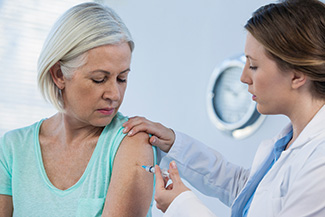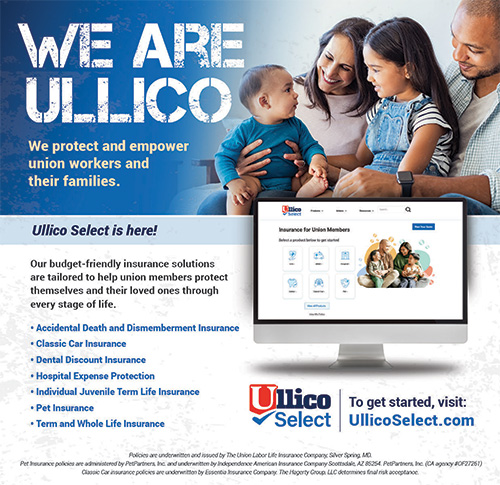Vaccines you need after age 50
 It’s not just babies and youngsters who need a poke to protect against serious, and potentially lethal, diseases. Adults need them too, especially as our immune systems weaken with age.
It’s not just babies and youngsters who need a poke to protect against serious, and potentially lethal, diseases. Adults need them too, especially as our immune systems weaken with age.
You already know it’s important to get your flu vaccine every year, ideally by the end of October. And when you go in for the shot, it’s a great time to make sure you’re up-to-date on all the other immunizations you should be receiving as an adult.
So what shots should you get at 50 and beyond?
“There are new vaccines that have come out in the past several years, specifically aimed at older adults,” says Morgan Katz, M.D., an assistant professor of medicine at Johns Hopkins University School of Medicine. Take for example, the new RSV vaccine, which was approved in May. Another is Shingrix, the amazingly effective shingles vaccine. And a few pneumococcal vaccines are on the market as well.
Below you’ll find the vaccinations every adult needs, followed by two — for hepatitis A and B — that you need only if you have certain risk factors.
VACCINES YOU DON’T NEED
What you won’t see on the list? Measles and chickenpox vaccines. Anyone born before 1957 doesn’t need a measles vaccine because the disease was so prevalent when they grew up that immunity as an adult is assumed, though the Centers for Disease Control and Prevention (CDC) says adults who do not have presumed immunity should get at least one dose of MMR (measles-mumps-rubella) vaccine.
Chickenpox is similar in that most adults already have immunity from childhood exposure to the disease, Katz says.
“Almost all adults over 40 have been exposed to chickenpox,” she says, noting that it would be “an extremely rare case” for an adult not to have been. That said, if you think you could be in that tiny minority, ask your doctor about getting the chickenpox vaccine as an adult.
For the rest of the list, you can get your necessary shots at doctors’ offices, pharmacies, workplaces, community health clinics and other locations. And most health insurance plans will pick up the tab. So stop in and let ’em stick it to you.
WHAT VACCINES DO ADULTS NEED?
Talk to your health care provider about your specific needs. Adult vaccines to consider include:
1. Influenza (Flu) Vaccine. The influenza vaccine is an annual necessity for individuals over 50. The flu can lead to severe complications, such as pneumonia, which can be particularly dangerous for older adults. Getting a flu shot each year can help reduce the risk of infection and its associated complications.
2. Shingles (Herpes Zoster) Vaccine. Shingles is a painful and debilitating condition caused by the reactivation of the varicella-zoster virus. The risk of shingles increases with age, and the vaccine, typically given as Shingrix, can significantly reduce the chances of developing this painful condition.
3. Pneumococcal Vaccines. Pneumococcal disease can lead to serious respiratory infections and pneumonia. Adults over 50 are recommended to receive two different pneumococcal vaccines – Pneumovax 23 and Prevnar 13. These vaccines provide protection against a range of pneumococcal strains.
4. Tetanus, Diphtheria, and Pertussis (Tdap) Vaccine. The Tdap vaccine not only provides a booster for tetanus and diphtheria but also protects against pertussis (whooping cough). Pertussis can be severe and even life-threatening in older adults, so keeping up to date with this vaccine is crucial.
5. Hepatitis B Vaccine. Hepatitis B is a viral infection that can lead to liver damage. Although it is more common among younger individuals, adults over 50 with specific risk factors, such as diabetes or certain medical conditions, may benefit from the hepatitis B vaccine.
6. Meningococcal Vaccine. Meningococcal disease is rare but can be severe. Older adults with certain medical conditions or those living in close quarters (like college dorms or long-term care facilities) may need the meningococcal vaccine to protect against this potentially deadly infection.
7. COVID-19 Vaccine. The COVID-19 pandemic has highlighted the importance of vaccines. Older adults are at a higher risk of severe illness and complications from the virus. It’s essential to receive COVID-19 vaccines and booster shots to protect yourself and those around you.
8. Human Papillomavirus (HPV) Vaccine. While HPV vaccination is often associated with younger populations, some individuals may still benefit from it after 50. HPV can lead to various cancers, and if you haven’t been vaccinated earlier in life, discuss the possibility with your healthcare provider.
Vaccines are a critical component of maintaining good health as we age. They can help prevent serious diseases, protect against complications, and ultimately enhance our quality of life. Consult with your healthcare provider to determine which vaccines are right for you based on your age, medical history, and specific risk factors. Remember, staying up to date with recommended vaccines is a proactive step towards a healthier and more vibrant life after 50.



Leave a Reply